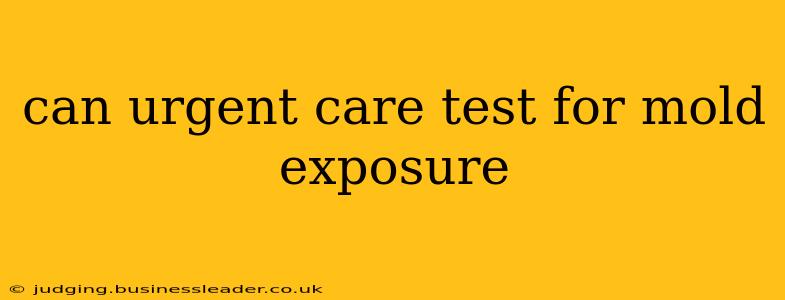Mold exposure can trigger a range of health problems, from mild allergies to severe respiratory illnesses. If you suspect you've been exposed to mold, you might wonder if urgent care can help. The short answer is: it depends. While urgent care facilities can't definitively diagnose mold exposure, they can assess your symptoms and determine if further testing or specialist referral is necessary.
This article will explore what urgent care can and can't do regarding mold exposure testing, providing clarity on when to seek their services and when to look elsewhere.
What Urgent Care CAN Do for Mold Exposure Symptoms
Urgent care centers are equipped to handle immediate health concerns. If you are experiencing symptoms that you suspect are related to mold exposure, they can:
- Assess your symptoms: A physician will take your medical history and examine you, paying close attention to your symptoms. Common symptoms of mold exposure include coughing, sneezing, watery eyes, nasal congestion, skin rash, and shortness of breath. More severe reactions can involve wheezing, difficulty breathing, and chest pain. Describing your environment, including any potential mold exposure sources, is crucial for the assessment.
- Provide immediate treatment for symptoms: If your symptoms are severe, such as difficulty breathing, the urgent care physician can provide immediate treatment to alleviate your symptoms. This might include inhalers, medications for allergic reactions, or oxygen therapy if needed.
- Refer you to a specialist: Based on your symptoms and medical history, the urgent care physician might recommend you see a specialist, such as an allergist, pulmonologist, or infectious disease specialist. These specialists are better equipped to perform comprehensive mold exposure testing and diagnosis.
What Urgent Care CANNOT Do for Mold Exposure
It's essential to understand the limitations of urgent care when it comes to mold exposure. They:
- Do not typically perform mold exposure tests: Urgent care facilities are not usually equipped to conduct the specific laboratory tests necessary to confirm mold exposure. These tests typically involve environmental sampling (air or surface samples) and are conducted by specialized environmental testing companies or industrial hygienists.
- Cannot definitively diagnose mold exposure: While they can evaluate your symptoms and assess their potential link to mold, they cannot make a definitive diagnosis of mold exposure without specialized testing.
Can Urgent Care Test for Mold Allergies?
While urgent care won't test for mold exposure itself, they can often perform tests to check for mold allergies. These allergy tests, typically skin prick tests or blood tests, identify whether you have an allergic reaction to specific mold types. However, a positive allergy test doesn't automatically confirm that your current symptoms are caused by mold exposure; it simply shows you have an allergy. Further investigation might still be needed to determine the source of your symptoms.
What are the Next Steps After Visiting Urgent Care for Mold Exposure Symptoms?
If urgent care suspects a connection between your symptoms and mold exposure, they will likely recommend:
- Environmental testing: This involves collecting samples from your home or workplace to determine the presence and type of mold. You'll need to contact an environmental testing company for this service.
- Specialist referral: An allergist, pulmonologist, or other specialist can conduct further testing and provide a more accurate diagnosis and treatment plan.
In Summary: When Should You Visit Urgent Care?
Visit urgent care if you're experiencing concerning symptoms that you suspect may be related to mold exposure, particularly if those symptoms are severe or rapidly worsening. They can offer immediate relief, assess your condition, and guide you toward appropriate next steps, like environmental testing and specialist referral. However, remember that urgent care cannot diagnose mold exposure; they'll play a crucial role in initiating the proper investigation.
